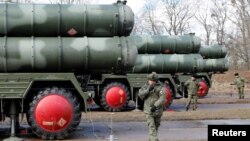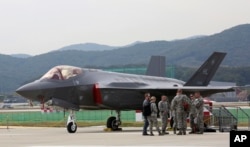Turkey's purchase of a Russian air defense missile system should not trigger U.S. sanctions because Ankara is not an adversary of Washington and remains committed to the NATO alliance, Defense Minister Hulusi Akar said Monday.
Speaking at a U.S.-Turkey conference in Washington amid rising tensions between the two NATO allies over Ankara's plan to buy the Russian S-400 missile system, Akar adopted a relatively conciliatory tone and urged to resolve issues via dialogue.
"Turkey is clearly not an adversary of the United States," Akar said and added that, therefore, its procurement of the S-400 system should not be considered within the scope of U.S. sanctions designed to target America's enemies.
U.S. Secretary of State Mike Pompeo said last week that Washington had told Ankara it could face retribution for buying the S-400s under a sanctions law known as Countering America's Adversaries Through Sanctions Act (CATSAA).
"This procurement decision does not signify a change in Turkey's course. I'd like to reiterate strongly that there is no change in Turkey's commitment to NATO," Akar said.
The disagreement over the F-35 is the latest of a series of diplomatic disputes between the United States and Turkey including Turkish demands that the United States extradite Islamic cleric Fethullah Gulen, differences over Middle East policy and the war in Syria, and sanctions on Iran.
Turkish President Recep Tayyip Erdogan has refused to back down from Ankara's planned purchase of a Russian S-400 missile defense system that the United States has said would compromise the security of F-35 aircraft, made by Lockheed Martin.
Turkey has said it will take delivery of the S-400s in July.
In early April, the United States halted delivery of equipment related to the stealthy F-35 fighter aircraft to Turkey, marking the first concrete U.S. step to potentially blocking the delivery of the jet to the NATO ally.
Akar said Turkey was puzzled by the move and expected U.S. and other partners in the program to fulfill their obligations.
"We firmly believe that linking the S-400 to the F-35 project is unfortunate. ... We are one of the investors and partners and not just a buyer. We have invested over $1 billion ... and fulfilled all our obligations," he said.
Akar repeated Turkey's offer to hold technical talks with the United States to address "technical concerns" over the S-400 purchase.
Turkey is also assessing a renewed offer from the United States to buy Patriot missile defense systems, Akar added.
"Recently, we received the restated offer for the Patriots. This offer is now on the table, we are studying it carefully," he said.







